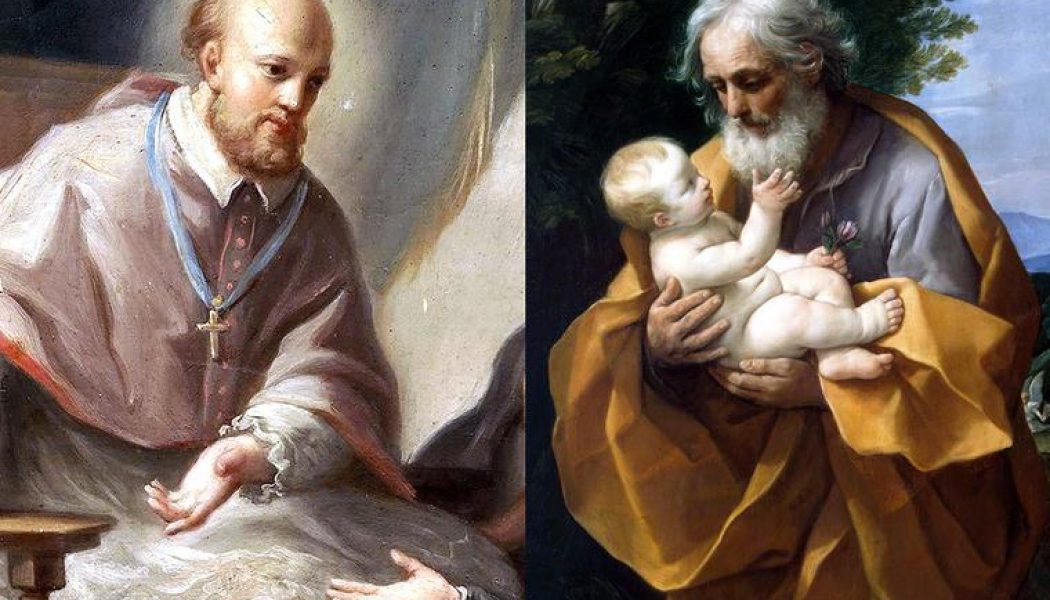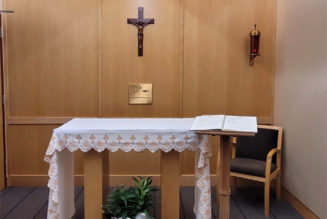
St. Francis de Sales did not see a Year of St. Joseph proclaimed during the 17th century in which he lived, but he had quite a bit to share about St. Joseph for Register readers during a recent interview.
St. Joseph, we know, teaches us much by his actions. What does he teach us when the angel tells him to flee to Egypt?
How we ought to embark on the sea of Divine Providence, without food, without oars, without sails, and, in short, without any sort of provisions; and thus leave all the care of ourselves and of the success of our affairs to our Lord, without reflection, or replies, or any fear whatever of what may happen to us. For the angel says merely, “Take the Child and the Mother and fly into Egypt” without telling him either by what road, or what provisions they would have for their journey, or to what part of Egypt, still less who would receive them or how they would be fed while they were there. Had not poor St. Joseph reason to make some reply?
What kind of reply could he have make to an angel?
Might not St. Joseph have said to the angel: “You tell me to take the Child and the Mother; tell me then, if you please, how I am to feed them on the way? for you well know, my lord, that we have no money.” He said nothing like this; he fully trusted that God would provide. And so he did, though sparingly, giving them enough to live simply upon, either by the trade of St. Joseph, or even by the alms that were given them…
Oh! how much he must have felt that distress of which we are speaking, seeing that the angel had not even told him how long he was to remain there! He could not establish himself in any permanent home, not knowing when the angel might command him to return.
What do you see as one of the virtues St. Joseph was showing and teaching us at that time?
Perfect obedience of St. Joseph! The angel did not tell him what time he was to remain in Egypt … a land, not only of strangers, but of enemies of the Israelites; inasmuch as the Egyptians still resented their departure and their having been the cause of a great number of the Egyptians being drowned in pursuit of them. I leave you to imagine how much St. Joseph must have longed to return … nevertheless he remained always the same, always sweet, tranquil, and persevering in his submission to the good pleasure of God, by which he let himself be entirely guided; for as he was just, his will was always submissive, united, and conformed to that of God. To be just is nothing else but to be perfectly united to the will of God, and to be conformed to it in all events prosperous or adverse. That St Joseph was always, on all occasions, perfectly submissive to the Divine Will, none can doubt.
What can you tell us about St. Joseph being the foster, or reputed, father of Jesus?
Oh, what a divine union between our Lady and the glorious St. Joseph! A union which made that Good of eternal goods, which is our Lord, belong to St. Joseph, as he belonged to our Lady, (not by the nature that he had taken in the womb of our glorious Mistress, a nature that had been formed by the Holy Spirit of the most pure blood of our Lady), but according to grace, which made him a partaker of all the goods of his dear Spouse, and which made him go on growing wonderfully in perfection; and this was by his continual communication with our Lady, who possessed all virtues in so high a degree that no other pure creature can attain to it. Still the glorious St. Joseph was the one who approached nearest to it.
In the Church we know St. Joseph approached nearest to her in virtue. How do you explain this in a simple way for our understanding?
As we see a mirror opposite to the rays of the sun receive its rays very perfectly, and another mirror placed opposite to that which receives them (though the last mirror takes or receives the rays of the sun only by reverberation), yet represent them so clearly that we can hardly decide which it is that receives them immediately from the sun, whether that which is opposite the sun, or that which receives them only by reverberation. So was it with our Lady, who was like a very clear mirror opposite to the rays of the Sun of justice, rays which brought into her soul all virtues in their perfection; and these perfections and virtues so perfectly reverberated on St. Joseph, that he almost seemed to be as perfect, and to have virtues in as high a degree as the glorious Virgin our Lady.
In the last several decades the idea of fathers, fatherhood and fathers being the head of the family has been under serious attack. The family is threatened because of it. What does St. Joseph’s role in the Holy Family teach us?
Observe the order that is kept in this holy family. … Who can doubt that our Lady was greater than St. Joseph, and that she had more discretion, and qualities proper for governing, than her spouse? Yet the angel does not address himself to her for what is required to be done, whether it be going or coming, or anything else. Does it not seem to you that the angel commits a great indiscretion in addressing himself rather to St. Joseph than to our Lady, who is the head of the house, carrying with her the Treasure of the Eternal Father? Had she not reason to be offended at this proceeding, and way of acting? Doubtless she might have said to her husband: “Why should I go into Egypt, since my Son has not revealed to me that I ought to do so, nor has the angel spoken to me of it?” Now our Lady says nothing of this sort. She is not offended because the angel addresses himself to St. Joseph, but she obeys quite simply, because she knows that God has so ordered…
O God! how beautiful it was to see the respect and reverence with which he treated both the Mother and the Son! If he had wished to leave the Mother when he was not quite aware of the greatness of her dignity, into what admiration and profound abasement was he not afterwards plunged, when he saw himself so honored that our Lord and our Lady became obedient to his will, and did nothing but by his command?
St. Joseph didn’t go about telling people about life in the Holy Family. So what does he teach us about his virtues?
My God! to be the guardian of our Lord; and not only that, but to be also his reputed father. To be the husband of his most holy Mother!
St. Joseph was more valiant than David, and wiser than Solomon; yet who could have thought so, without being enlightened by heavenly light, seeing him reduced to exercise the trade of a carpenter, so completely did he keep hidden all the signal gifts that God had bestowed upon him. But what amount of wisdom did he not possess, since God gave in charge to him his most glorious Son, and chose him to be his guardian?
Since God could choose for the guardian of his Son the man in the world the most accomplished in all sorts of perfections, according to the dignity and excellence of his Charge, who was his most glorious Son, the universal Prince of heaven and earth, how could it be that being able, he did not will it and did not do it?
There is, then, no doubt that St. Joseph was endowed with all the graces and all the gifts that were required for the care which the Eternal Father willed to give him of the temporal and domestic economy of our Lord, and of the guidance of his family … who represent to us the mystery of the most holy and most adorable Trinity; not that there is any comparison except with regard to our Lord, who is one of the Persons of the most Holy Trinity, for the others are creatures. But yet we may say that it is a Trinity on earth, which in a manner represents to us the most Holy Trinity: Mary, Jesus and Joseph; Joseph, Jesus and Mary; a Trinity marvelously estimable and worthy of being honored.
You understand, then, how elevated was the dignity of St. Joseph, and how he was filled with all sorts of virtues; you see also how, nevertheless, he was more humble and abject than we can describe or imagine. This one example will suffice to make it clear. He goes into his own country and to his town of Bethlehem, and (as far as we know) nobody but himself was rejected from all the houses; so as to be forced to retire and to take his chaste spouse into a stable among the oxen and asses. Oh, to what an extremity was his abjection and humility reduced!
Why did he agonize over what to do when he learned Mary was expecting a child?
His humility was the reason (thus St. Bernard explains it) that he wanted to leave our Lady, when he found her with child; for St. Bernard says that he held this discourse within himself — “What is this? I know that she is a virgin, for we have made a vow together to keep our virginity and purity, which she would not on any account break, and yet I see that she is with child and that she is a mother. How can it be that maternity is found with virginity, and that virginity does not prevent maternity? O God!” he said to himself, “may she not be that glorious virgin of whom the prophets declare that she shall conceive and be the Mother of the Messiah? Oh! if it be so, God forbid that I should remain with her, I who am so unworthy; it were better to abandon her secretly, on account of my unworthiness, and not to live any longer in her company” … what more perfect humility can be imagined than that of St. Joseph?
Another virtue of St. Joseph’s for us to imitate?
We may well say, valiant and strong is the man who, like St. Joseph, perseveres in this virtue [humility]; for he conquers at the same time the devil and the world, which is full of ambition, vanity and pride.
Many saints believe and have taught that St. Joseph, like Our Lady, in heaven body and soul. What do you have to say?
We must nowise doubt that this glorious Saint has great credit in heaven with him who has so favored him as to raise him to it both body and soul — which is the more probable as we have no relic of him here below on earth. It seems to me that no one can doubt this truth. For how could he who had been obedient to him all the time of his life, have refused this grace to St Joseph?
No doubt, when our Lord descended to Limbus, St. Joseph spoke to him in this manner:
“O my Lord, I pray Thee to remember that when Thou camest from heaven to earth, I received Thee into my house, into my family; and that as soon as Thou wast born, I received Thee into my arms. Now that Thou art going to heaven, take me with Thee. I received Thee into my family, receive me now into Thine, since Thou art going there. I have carried Thee in my arms, carry me now in Thine. And as I took care to support and guide Thee during the course of Thy mortal life, do Thou take care of me and guide me to life eternal.”
And if it is true, as we must believe, that by virtue of the most Holy Sacrament which we receive, our bodies will rise again at the day of judgment, how can we doubt that our Lord caused to rise with him to heaven in body and soul the glorious St. Joseph who had had the honor and the grace of carrying him so often in his blessed arms, in which our Lord took such pleasure? Oh, how many kisses he tenderly gave him with his blessed mouth, to reward, in some measure, his labor!
St. Joseph, then, is in heaven in body and soul, there is no doubt of it.
Why, after our Blessed Mother is he our greatest intercessor?
Oh, how happy should we be, if we could deserve to have a share in his holy intercession, for nothing will be refused him, either by our Lady, or by her glorious Son. He will obtain for us, if we have confidence in him, a holy growth in all sorts of virtues, but especially in those we have found that he possessed in a higher degree than any others, which are most holy purity of body and mind, the most amiable virtue of humility, constancy, valor, and perseverance — virtues which will render us victorious over our enemies in this life, and make us merit the grace to go and enjoy in eternal life the reward prepared for those who shall imitate the example given them by St. Joseph while he was in this life, a reward which will be nothing less than eternal happiness, in which we shall enjoy the clear vision of the Father, of the Son, and of the Holy Ghost.
Thank you for this wonderful interview, St. Francis de Sales.
Join Our Telegram Group : Salvation & Prosperity









